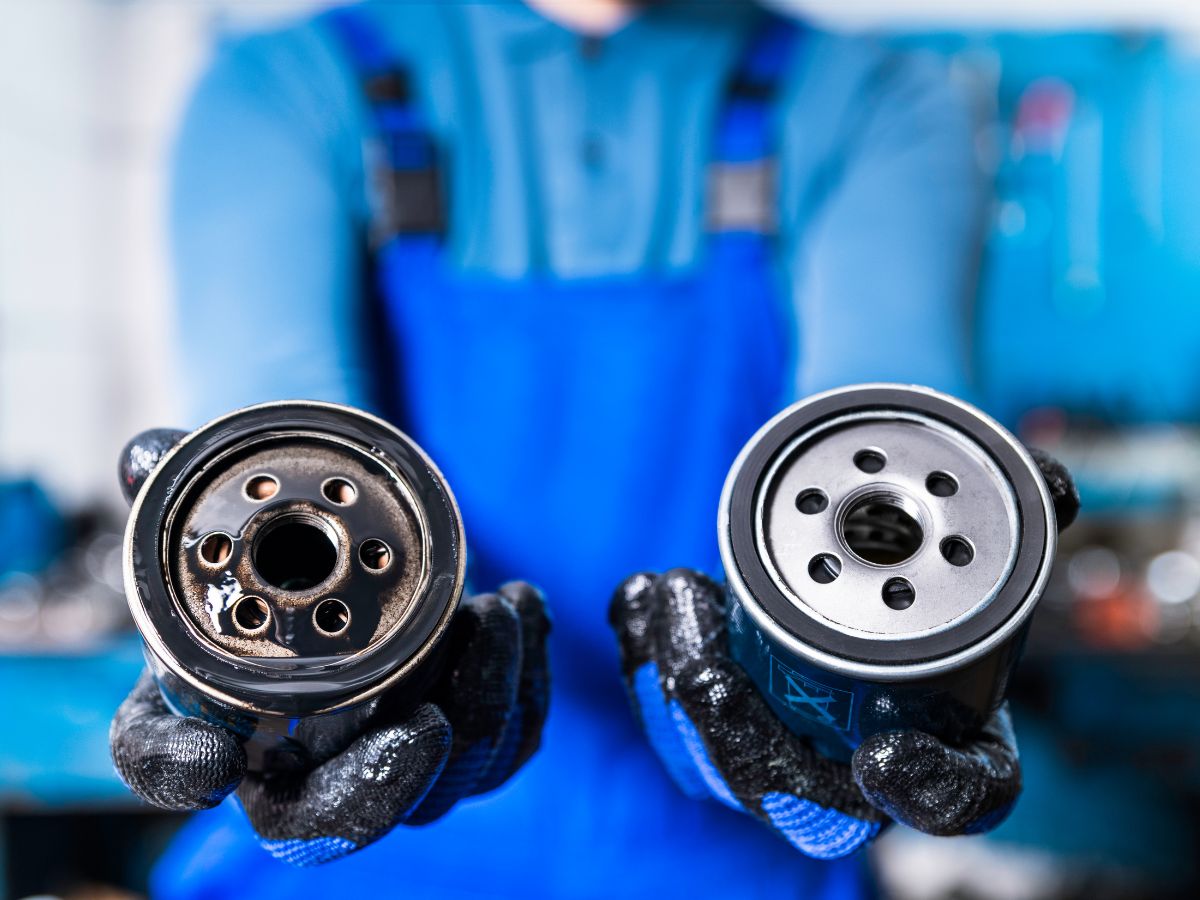In This Article Show
Every journey begins with a single turn of the ignition. But what ensures that your ride is smooth, efficient, and long-lasting? The unsung hero under the hood – an oil filter. This vital component is the engine’s first line of defense that keeps it clean, healthy, and running at peak performance. We have shortlisted the best oil filters for synthetic oil. Each product has been selected based on its key characteristics, durability, filtration efficiency, and user reviews. We have also highlighted each product’s key features, pros, and cons to help you make an informed decision.
The Best Oil Filters For Synthetic Oil (According to Research)
Finding the right oil filter for your car engine, especially if it uses synthetic oil, is a crucial job. It needs thorough research and careful consideration regarding your vehicle needs. However, we aim to ease up your quest with our detailed research.
Understanding Synthetic Oil
Hello there! As an experienced mechanic with over 13 years of experience in the auto industry, I’ve had my fair share of encounters with all types of engine oils. Today, we will break down synthetic oil’s ins and outs in a simple, easy-to-understand manner.
First off, let’s dive into what synthetic oil is. Synthetic oil is a lubricant of chemical compounds artificially made from compounds other than crude oil. This oil is designed in a lab, engineered by scientists who can tweak its molecular structure to suit the specific needs of modern engines. These oils are tailored to deliver superior levels of efficiency, engine protection, and longevity.
Now, why is synthetic oil gaining popularity? The primary benefit of synthetic oil are its ability to function effectively at high and low temperatures. Synthetic oil flows quickly to engine parts in harsh cold conditions to provide immediate protection. Conversely, synthetic oil resists breaking down in hot conditions better than conventional oil, ensuring prolonged engine life.
As an experienced mechanic, I’ve observed that vehicles running on synthetic oil generally have better engine performance. They offer better viscosity at low temperatures and are less likely to form sludge or deposits in the engine than their conventional counterparts. Moreover, synthetic oil can also lead to improved fuel efficiency.
However, synthetic oil requires unique maintenance, which brings us to the need for a special oil filter for synthetic oil. These filters deal with synthetic oils’ longer oil change intervals and provide better filtration.
In my 13 years of hands-on experience in the field, I’ve learned that using the right oil filter for synthetic oil is just as important as choosing the right oil for your vehicle. It contributes significantly to the lifespan and performance of your engine, and you certainly wouldn’t want to compromise on that.
The Basics of Oil Filters
An oil filter, as the name suggests, is a filter designed to remove contaminants from your car’s engine oil, transmission oil, lubricating oil, or hydraulic oil. Their primary purpose is to screen out any impurities that may have entered the oil and can harm the engine.
The functioning of an oil filter is fairly straightforward. As the engine operates, it pumps oil into the filter through small perforations in the base plate. The oil then passes through the filter media, where the contaminants are trapped. The cleansed oil eventually returns to the engine, ready to lubricate essential components.
Oil filters work in conjunction with synthetic oil excellently. Given the high-performance nature of synthetic oil, it’s crucial to have an oil filter capable of matching its performance. Synthetic oil filters are designed to last longer and offer superior filtration compared to conventional oil filters.
They are typically made from synthetic materials, which provide better filtration efficiency. This is vital because synthetic oils last longer, meaning the oil filter has to perform at its best for a more extended period.
In essence, synthetic oil filters are specifically designed to meet the high demands of synthetic oils, ensuring maximum engine protection, efficiency, and longevity.

Do synthetic oils require different filters than regular oil?
Synthetic oils and conventional oils can generally use the same oil filters. However, synthetic oils often have superior performance characteristics, such as better flow in cold temperatures, better protection at high temperatures, and longer oil change intervals. Because of these properties, synthetic oils can sometimes benefit from high-performance oil filters.
High-performance oil filters typically have better construction and use higher-quality filter media. They are designed to trap and hold more contaminants over a longer period, which aligns with the extended oil change intervals of synthetic oils. These filters can also handle the better flow characteristics of synthetic oils at extreme temperatures.
Although synthetic oils don’t necessarily require different filters than regular oil, using a high-quality filter can help you take full advantage of the benefits of synthetic oil.
5 Best Oil Filters For Synthetic Oil
The main role of an oil filter is to sift out impurities and contaminants such as dust, metallic particles, and carbon deposits that could potentially damage your engine. It also ensures the smooth operation of the engine by preventing premature wear of its components.
Given its importance, selecting the appropriate filter is crucial. With a plethora of choices available, it can be challenging to determine the best fit, especially for synthetic oil. To help you navigate this, we’ve compiled a list of the top five synthetic oil filters currently available in the market::
1. PurolatorONE L14610 Oil Filter
The Purolator L14610 Oil Filter is designed to meet or exceed original equipment manufacturer (OEM) requirements. This oil filter can provide up to 10,000 miles of engine protection.
It features Purolator’s exclusive high-density media technology, which filters out harmful contaminants while maintaining high flow rates. The filter’s silicone anti-drain back valve ensures safe engine startups, while its double helix flow center tube helps in optimizing the oil flow.
The metal end caps provide stability and integrity for greater wear resistance.
2. Mobil 1 M1110A Performance Oil Filter
The Mobil 1 M1110A Extended Performance Oil Filter is designed for long-lasting performance and superior filtration. This oil filter can provide up to a year or 20,000 miles of protection when used with synthetic oil.
It features advanced synthetic fiber blend media for excellent contaminant removal. Its durable filter canister can withstand up to nine times the normal system operating pressure.
The filter also has a 99.6% Multi-Pass Efficiency Rating and an advanced media capacity for holding more dirt.
3. Bosch Automotive 3300 Premium FILTECH Oil Filter
Bosch is a known name in the auto industry, particularly for producing high-quality fuel and oil filters. The Bosch Automotive 3300 Premium is no different.
It uses Bosch’s exclusive FILTECH media technology, which eliminates any harmful contaminants for greater engine protection. The sturdy steel plates prevent warpage or leakage, while the lubricity gasket design provides a tight seal, leaving room for easy removal.
4. Royal Purple 341777 Royal Purple Extended Life Oil Filter
The Royal Purple 341777 Extended Life Oil Filter is engineered to deliver exceptional particle removal, superior performance, and optimized flow properties for enhanced performance and extended filter lifespan.
This filter boasts a 100% synthetic micro-glass media, which excels in particle removal, offering a remarkable filtration efficiency of 99% at 25 microns. Similar to other filters in this list, it also incorporates a silicone anti-drain back valve. This feature prevents dry starts by stopping the oil from draining back during the shutdown.
The shell of the filter is extra heavy-duty; it is made from a thick shell material to resist puncture, and the center tube prevents filter collapse.
5. WIX 57356XP Oil Filter
The WIX 57356XP Oil Filter also provides reliable and efficient performance. It is made with synthetic media for improved engine protection by trapping contaminants such as dirt, dust, and soot before reaching your engine.
The filter also possesses a nitrile sealing gasket that resists breakdown from oil, fuel, and coolant exposure. It is designed to withstand harsh driving conditions and is recommended for use in Yamaha motorbikes, tractors, and trucks.
Factors to Consider When Choosing Oil Filters for Synthetic Oil
Picking the right oil filter for synthetic oil is a critical step towards ensuring your engine’s longevity and performance. Over my 13-year tenure as a professional mechanic, I’ve learned that several key factors can guide you to make an informed choice. Here they are:
Compatibility with Synthetic Oil
Not all oil filters are designed to work with synthetic oil. Synthetic oil has different characteristics compared to conventional oil, and as such, it requires an oil filter that can handle its properties. Always check the product’s specifications to confirm its compatibility with synthetic oil.
Filter Media
The filter media is the material that traps and removes the impurities from the oil. The media should be strong, durable, and efficient for synthetic oil filters to handle longer service intervals. Synthetic oil filters use synthetic fibers, offering superior filtration and durability.
Construction and Durability
The construction of the oil filter is crucial. It should be robust enough to withstand high pressure for prolonged periods. Pay attention to the materials used, the sealing gasket’s quality, and the base plate’s strength. A durable filter will resist premature wear and tear and will provide reliable performance.
Efficiency and Capacity
Efficiency refers to the filter’s ability to remove contaminants from the oil. Look for filters that have a high efficiency rating, typically around 99%. Capacity refers to the amount of dirt and debris the filter can hold. An oil filter with a high capacity will maintain its efficiency over a longer period.
Brand Reputation
The brand matters. Opt for brands that have a proven track record in the industry. These brands have invested time, resources, and technology in their products and are more likely to provide reliable and effective oil filters.
Price
While it’s essential to stick to a budget, it’s not advisable to compromise on quality for the sake of cost. Higher-end oil filters might seem expensive initially, but they can save you money in the long run by enhancing engine life and performance.
Consider these factors, and you’ll be well on your way to picking the right oil filter for synthetic oil. In the upcoming section, I’ll share some top-notch oil filter recommendations based on my years of hands-on experience in the field. Stay tuned!
How to Change Your Oil Filter
Changing an oil filter is a task that can be done right at home with a little bit of knowledge and the right tools. As someone who has spent over 13 years in the field, I’ve performed this task countless times. Here’s a simple, step-by-step guide on how to do it:
- Required Tools: A new oil filter, new engine oil, oil filter wrench, oil catch pan, socket set, funnel, jack stands, gloves, and safety glasses.
- Disclaimer: Always ensure to wear proper safety gear during the process to avoid any accidental injury.
Step 1: Prepare Your Vehicle
Park your car on a level surface. Apply the parking brake for added safety. Using a jack, lift your car off the ground and secure it with jack stands.
Step 2: Drain the Old Oil
Locate the oil drain plug underneath your vehicle. Position your oil catch pan beneath it. Using the correct socket or wrench, loosen the plug and let the old oil drain into the pan. Be careful, as the oil might be hot.
Step 3: Remove the Old Oil Filter
After all the oil has been drained, locate your oil filter. Using an oil filter wrench, loosen the oil filter. Remember, it will have oil in it, so have your oil catch pan handy to catch any spills.
Step 4: Install the New Oil Filter
Before installing the new oil filter, apply a little new oil to the new gasket on the top of the filter to ensure a good seal. Screw the new filter into place as tight as you can get it with your hand. Do not use a wrench as you may overtighten it.
Step 5: Refill with New Oil
With the new filter in place, it’s time to refill the engine with new oil. Position your funnel at the oil fill hole at the top of your engine, and pour in the correct quantity of new oil as specified in your vehicle’s owner manual.
Step 6: Check Oil Level
After you’ve added the new oil, pull out the oil dipstick, wipe it clean, reinsert it, then pull it out again to check the oil level. If necessary, add more oil until you reach the correct level.
Step 7: Clean Up
Start your engine and let it run for a few minutes, check underneath for any leaks. Dispose of your old oil responsibly. Many auto parts stores will recycle used oil for free.
Frequently Asked Questions
Can I Use a Regular Oil Filter with Synthetic Oil?
While you technically can use a regular oil filter with synthetic oil, it’s not the ideal pairing. Synthetic oil filters are specifically designed to handle the longer service intervals of synthetic oil and provide better filtration efficiency. Using a conventional oil filter may result in decreased engine performance and shorter oil change intervals.
How Often Should I Change My Synthetic Oil Filter?
Typically, it’s best to change your oil filter every time you change your oil. Given that synthetic oil lasts longer than conventional oil, you might be looking at changing your synthetic oil filter every 10,000 to 15,000 miles. However, always refer to your vehicle owner’s manual for specific recommendations.
Does Brand Matter When Choosing an Oil Filter?
Yes, the brand can play a significant role when choosing an oil filter. Renowned brands typically invest in extensive research and development to provide high-quality, reliable, and effective oil filters. However, this doesn’t mean that lesser-known brands don’t offer quality products. Always look at the product specifications and customer reviews before making your decision.
Is it Worth Spending More on a High-Quality Oil Filter?
Investing in a high-quality oil filter is usually worth the additional cost. These filters provide superior filtration, last longer, and can contribute to better engine performance and longevity. While it might seem like you’re saving money with a cheaper filter, you could face higher costs in the long run due to reduced engine life or performance.
Can I Change My Oil Filter Without Changing the Oil?
While it’s possible, it’s generally not recommended. When you change your oil, you’re removing the dirt and contaminants that have built up over time. If you leave the old oil in place when you change the filter, you’re immediately contaminating your new filter with the old oil.
Final Words
Navigating the world of synthetic oil filters can be a daunting task. Still, armed with the right knowledge, you can make an informed decision that ensures the longevity and optimal performance of your vehicle. Remember, the heart of your vehicle – the engine – relies heavily on the quality of the oil filter.
We hope this guide has shed light on the top synthetic oil filters in the market, their key features, pros, and cons. Your vehicle deserves the best; choosing a high-quality oil filter is a step in the right direction.
















